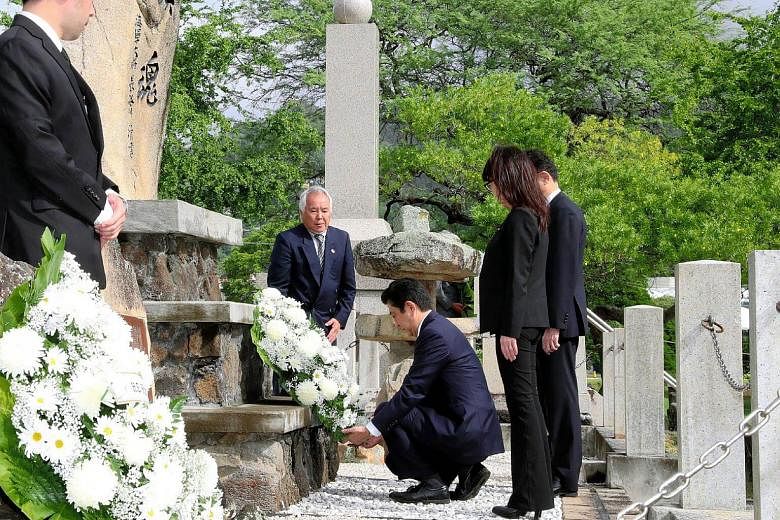Prime Minister Shinzo Abe's visit to Pearl Harbour will help Japan and the United States come to terms with some of the atrocities committed during World War II, analysts say.
It also comes at a time when US President-elect Donald Trump has taken a hawkish stand on China and questioned America's alliances abroad, including that with Japan, saying that allies do not do enough in return for the US' security partnership.
But Japan may be an exception. "Japan and the US need each other, and more so than at any other point in the history of the alliance," said Dr Harry J. Kazianis, senior fellow for defence policy at the conservative Centre for the National Interest. "Japan lives in a pretty rough neighbourhood. I think the historic and pragmatic are coming together."
Mr Richard McGregor, author of books on China's Communist Party and the US-Japan-China relationship, said that Japan is the most important bilateral military alliance the US has. "If Mr Trump is going to have any regional policy which gives him options against China, he needs Japan," he said.
There were no apologies made at Pearl Harbour, or at Hiroshima, which President Barack Obama visited in May.
Nevertheless, analysts noted that the Pearl Harbour visit was a historic step.
Professor Roy Denny, a security specialist and senior fellow at the East-West Centre in Honolulu, said: "Despite the strength of the alliance, US-Japan reconciliation is not 100 per cent complete. With Abe's visit, it takes another small step in this direction."
There are more American soldiers - around 54,000 - based in Japan than in any other foreign country. Their presence has, in some cases, bred resentment among resident Japanese.
Mr Abe has also stirred controversy over what has been seen as revisionism of Japan's role in World War II. Japanese nationalists are a growing force, and revisionists have downplayed Japan's role in the war, claiming, for instance, that US sanctions forced Japan into war.
China's Global Times newspaper, in a commentary yesterday, took a sour view of the Pearl Harbour visit, saying: "Although Abe may gain some political points from the West through this visit, it will not yield any substantive results if Japan glosses over China and other Asian countries in its historical issues."
But in Washington, Mr McGregor said Mr Abe has shrewdly dealt with the war issue. "He has made artfully worded but nonetheless highly promoted expressions of remorse at different times about the war," he said.
Defence cooperation with the US is also strengthening. Japan received its first Lockheed Martin F-35A Joint Strike Fighter from the US last month, and plans to buy 28 more over the next five years.
"If we take it at face value that (Mr Trump) is a businessman and a pragmatist, and maybe a realist on foreign policy issues, then he is going to see very quickly that the US-Japan alliance is the best deal he is going to get," said Dr Kazianis.


